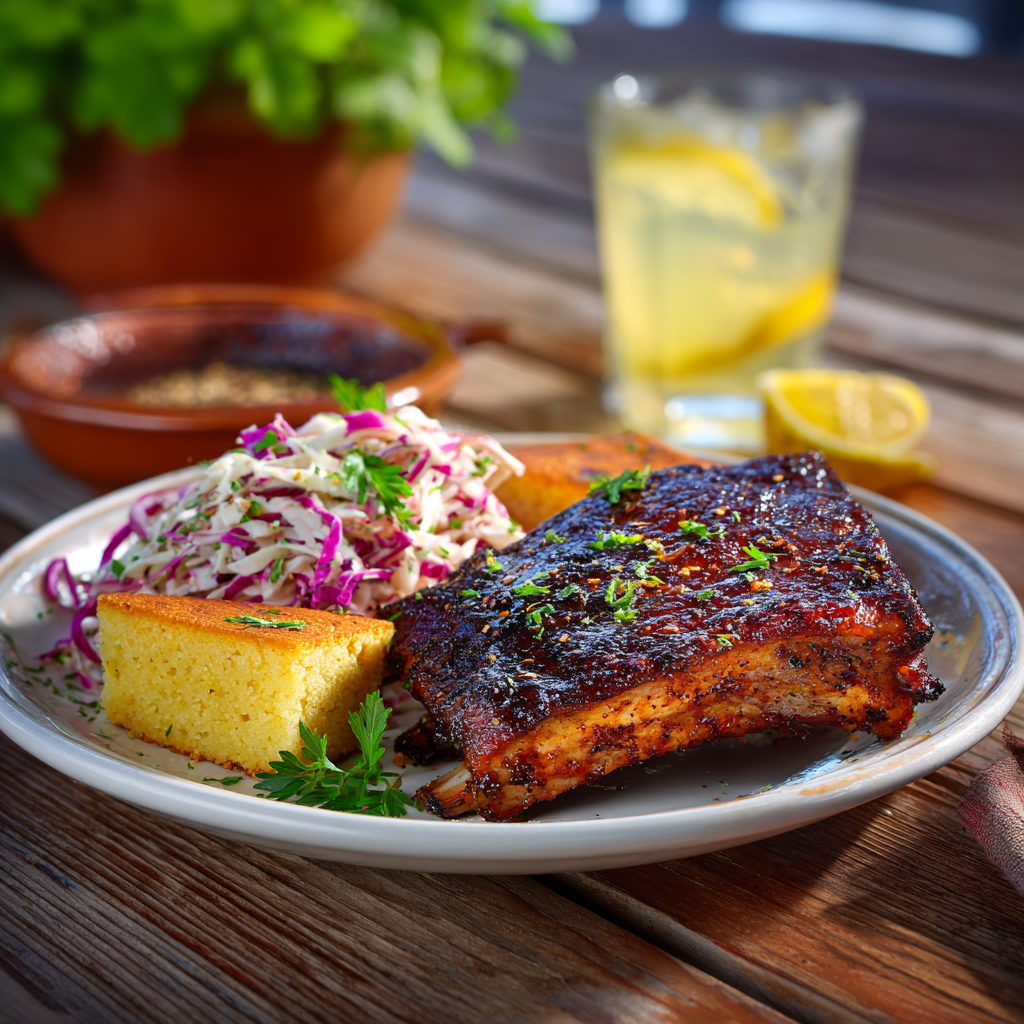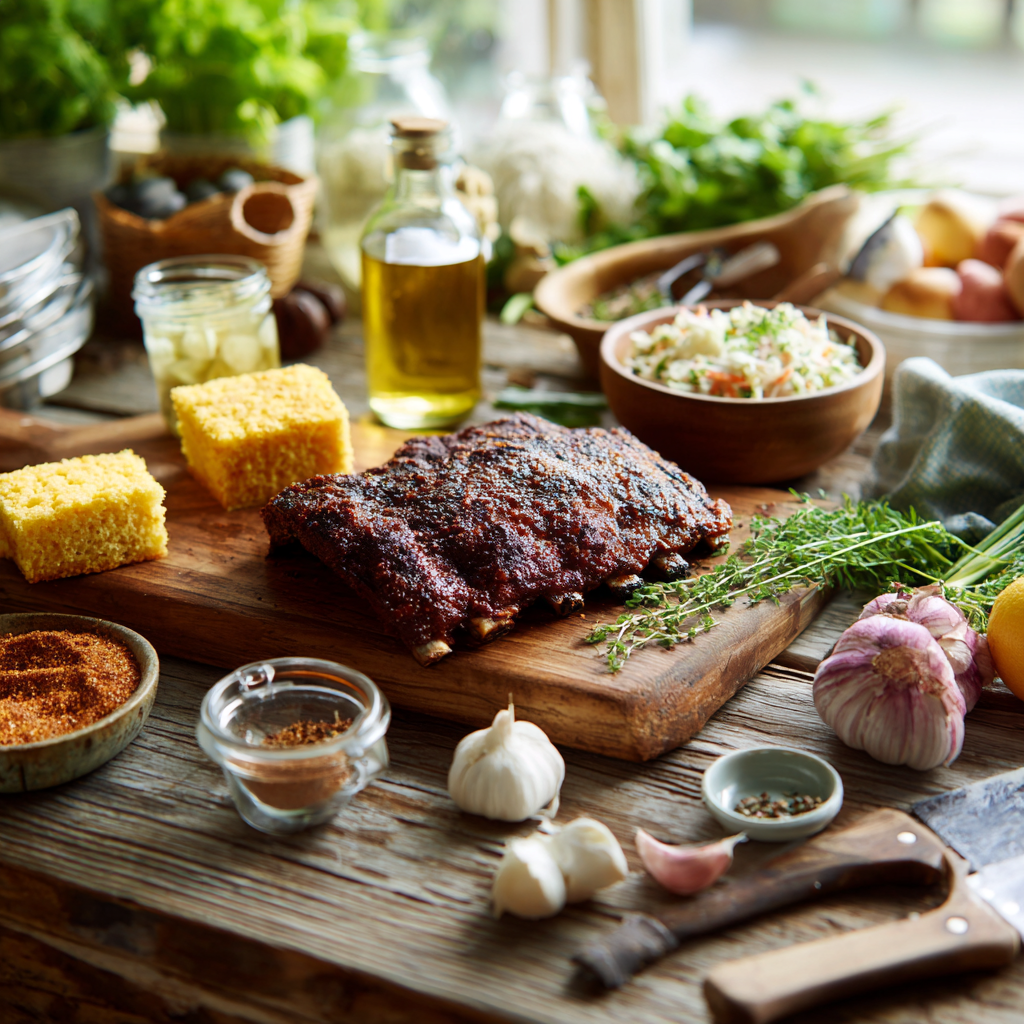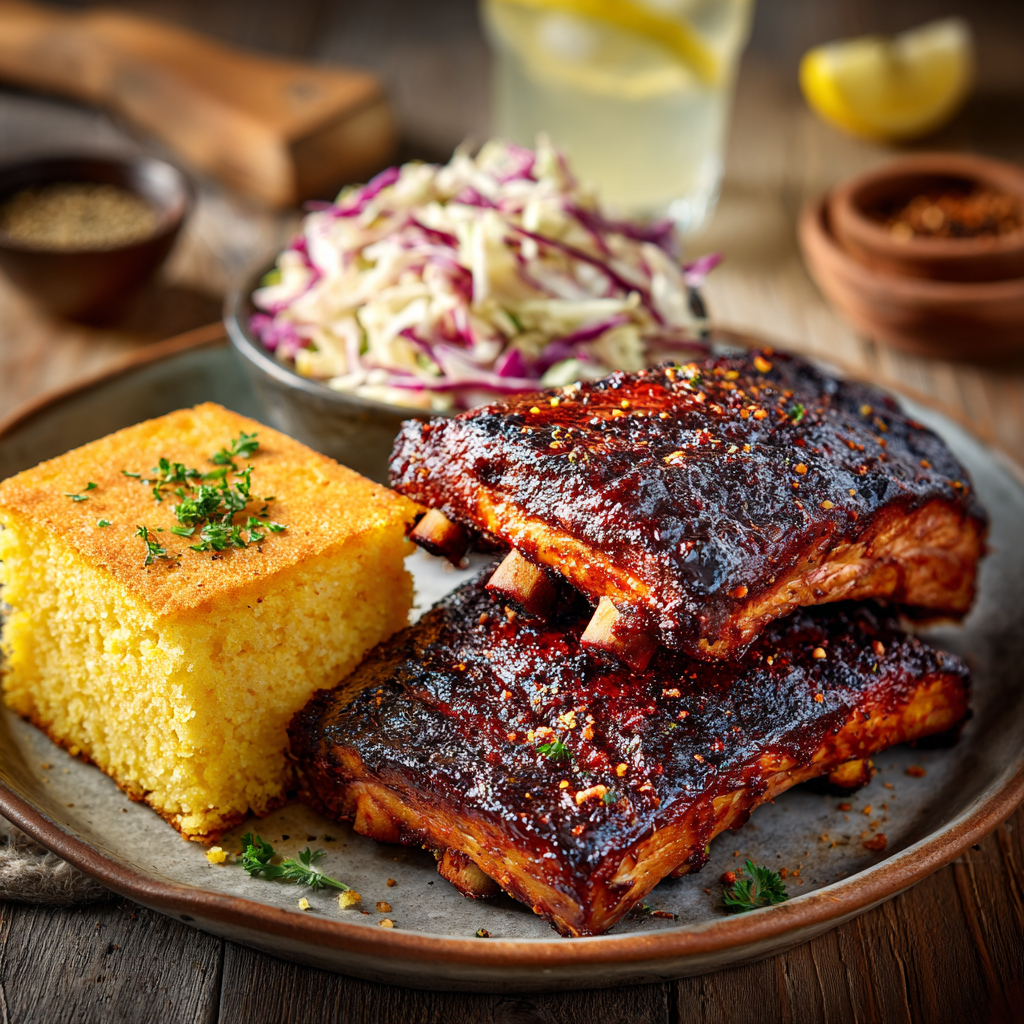Why Finding the Best BBQ Rub Can Transform Your Grilling
I still remember my first time grilling. The smell of smoke, the sizzle of meat, and that moment when I realized seasoning could make or break everything. That’s when I fell in love with finding the best BBQ rub. Over the years, I’ve tried countless store-bought blends and experimented with homemade recipes. Trust me, a good rub is more than just seasoning—it’s the secret to unforgettable flavor.
If you’re serious about grilling, nailing the right rub is essential. Whether you’re smoking ribs, chicken, or brisket, the right mix of spices can take your food from average to amazing. In this article, we’ll explore some top-rated options like the best BBQ rubs 2018, standout store-bought picks, and even easy-to-make recipes. By the end, you’ll know exactly how to choose or create the perfect rub for your next cookout.
What Makes a Great BBQ Rub?
A great BBQ rub isn’t just about throwing together random spices. It’s about balance. Every ingredient should work together to enhance the natural flavors of the meat without overpowering it. Let’s break down what makes a rub worth its salt—literally.
First, look for quality ingredients. Fresh spices and natural sugars make a big difference. You don’t want artificial fillers or stale seasonings dulling the taste. Second, think about flavor profiles. A well-rounded rub often combines:
- Sweetness: Brown sugar, honey powder, or molasses add depth.
- Saltiness: Coarse kosher salt or sea salt boosts overall flavor.
- Heat: Cayenne pepper, chili powder, or smoked paprika bring spice.
- Herbs and spices: Garlic powder, onion powder, cumin, or thyme add complexity.
These are the building blocks of many award-winning BBQ rub recipes. Whether you’re making your own or buying a premade blend, these components ensure a rub delivers on taste.
How Do You Choose the Right BBQ Rub?
Choosing a BBQ rub doesn’t have to feel overwhelming. Here’s what I always consider:
- Meat type: Different proteins pair better with certain flavors. For example, pork loves sweet and smoky, while beef can handle bold, spicy blends.
- Flavor intensity: Some rubs are mild, others pack a punch. Match the strength to your personal preference—or your guests’ taste buds.
- Purpose: Are you smoking low and slow or grilling hot and fast? Smoked meats benefit from deeper, richer rubs.
One question people often ask is: “What should I look for when choosing a BBQ rub?” My answer? Start with the label. Check for recognizable ingredients and avoid anything with long chemical names. If you’re unsure, go for trusted brands known for their best commercial BBQ rubs.
The Appeal of Store-Bought vs Homemade Rubs
When it comes to BBQ rubs, there’s no one-size-fits-all solution. Some folks love the convenience of store-bought options, while others prefer the control of homemade mixes. Both have their perks.
Store-bought rubs save time and effort. With so many brands out there, you can find something for every taste. Plus, they’re consistent—you know exactly what you’re getting each time. On the flip side, homemade rubs let you customize flavors to suit your style. Love extra heat? Add more cayenne. Prefer a sweeter profile? Toss in extra brown sugar.
Best Store Bought BBQ Rubs
Now, let’s talk about some of my favorite store-bought BBQ rubs. These are the ones I keep stocked in my pantry because they deliver every time:
- Stubbs BBQ Spice Rub: A versatile option with a balanced mix of sweet and savory notes. Perfect for beginners.
- Kingsford Signature Flavors: This brand offers a variety of blends, including hickory smoke and applewood. Great for experimenting.
- Bad Byron’s Butt Rub: Don’t let the name fool you—this rub is seriously good. It’s bold, flavorful, and ideal for pork.
- Plowboys Yardbird Rub: A favorite among competitive grillers, this one nails the sweet-and-spicy combo.
These picks represent some of the best commercial BBQ rubs available. They’re reliable, tasty, and widely loved by grillers everywhere.
Of course, if you’re feeling adventurous, why not try making your own rub? Recipes are easy to follow, and you might just stumble upon your new signature blend. Either way, having the right rub in your arsenal is key to mastering the art of grilling.
Why Try Making Your Own BBQ Rub?
You know, there’s something oddly satisfying about mixing up your own best BBQ rub. It’s like being a mad scientist in the kitchen—except instead of bubbling potions, you’re combining spices that smell amazing. Honestly, I wasn’t always into making my own rubs. At first, I stuck to store-bought blends because, let’s face it, they’re convenient. But one day, while whipping up a batch of Yummy Honey Chicken Kabobs, I decided to experiment with a homemade rub. And wow, did it make a difference.
Here’s the deal: when you make your own rub, you’re in total control. You get to tweak the flavors exactly how you like them. Want more heat? Add extra cayenne. Craving sweetness? Toss in some brown sugar or even a pinch of cinnamon for fun. The possibilities are endless, and trust me, once you try it, you might never go back to pre-made options.
By the way, don’t worry if you’re not a spice wizard yet. Some of the best BBQ rubs recipes are super simple. For instance, a basic combo of smoked paprika, garlic powder, onion powder, brown sugar, and salt can work wonders on almost anything you grill. Funny enough, I once threw together a random mix like this for a last-minute cookout, and people were asking if I’d bought some fancy best commercial BBQ rubs. Nope—it was all me!
Now, here’s a question I hear a lot: “Can I make a great BBQ rub at home without fancy tools?” Absolutely. All you need is a bowl, a spoon, and some measuring spoons. Seriously, no special gadgets required. In fact, I’ve made plenty of rubs using nothing but a mason jar to shake everything together. Easy peasy.
Top Recommendations for Specific Meats
Best BBQ Rub Recipe for Ribs
Let’s talk ribs for a second. If you’ve ever had ribs that were fall-off-the-bone tender with a finger-licking crust, chances are they had an awesome rub. Finding the best BBQ rub recipe for ribs can feel overwhelming, but it doesn’t have to be. Here’s the thing: pork ribs love bold flavors, so don’t be shy with your spices.
For a killer rib rub, try this combo:
- 1/4 cup brown sugar (for sweetness)
- 2 tablespoons smoked paprika (because smoke is life)
- 1 tablespoon garlic powder
- 1 tablespoon onion powder
- 1 teaspoon cayenne pepper (adjust based on your heat tolerance)
- 1 tablespoon kosher salt
- 1 teaspoon black pepper
Mix it all together, and you’ve got yourself a best bbq rub for ribs that’ll blow your socks off. Pro tip: Let the rub sit on the ribs for at least an hour before grilling or smoking. This gives the flavors time to penetrate the meat. Oh, and if you’re looking for a side dish to pair with those ribs, check out this Double Tomato Bruschetta. It’s fresh, zesty, and balances out the richness of the ribs perfectly.
Beyond Ribs: Exploring Other Meats
Ribs might steal the spotlight, but let’s not forget about other proteins. Chicken, beef brisket, and even fish can all benefit from a good rub. The trick is knowing how to adapt your blend. For example, chicken loves bright, citrusy notes. A rub with lemon zest, thyme, and a touch of honey works beautifully here. Speaking of chicken, I recently tried pairing a homemade rub with Honey Mustard Grilled Chicken, and it was a match made in heaven.
Beef brisket, on the other hand, calls for something deeper and more robust. Think coffee grounds, chili powder, and a generous amount of cumin. These ingredients add layers of complexity that complement the rich flavor of slow-smoked brisket. One of my favorite tricks is to sprinkle a bit of cocoa powder into the mix—it sounds weird, but it adds a subtle depth that’ll have everyone wondering what your secret is.
Funny story: I once used a brisket rub on salmon fillets by accident, and guess what? It turned out amazing. The key is balance. Fish tends to be delicate, so lighter rubs with herbs like dill or parsley work best. But hey, rules are meant to be broken, right?
Is there one rub that works well on all types of meat? Well, sort of. A versatile rub with a mix of sweet, salty, and spicy elements can handle most proteins. My go-to “all-purpose” blend includes brown sugar, smoked paprika, garlic powder, salt, and a dash of cayenne. It’s simple, effective, and pairs beautifully with everything from pork chops to grilled veggies. By the way, if you’re serving veggies alongside your meat, whip up some Hummus III as a dip—it’s creamy, flavorful, and a crowd-pleaser.
Here’s another tip: don’t be afraid to experiment. Sometimes the best discoveries happen by accident. I remember trying to recreate a bbq pitmasters rub recipes-style blend for a competition and accidentally added too much cinnamon. Instead of trashing it, I used it on chicken thighs, and it became one of my signature dishes. Moral of the story? Trust your instincts and have fun with it.
Gift Ideas for Grill Enthusiasts
If you’re like me, you probably know someone who geeks out over grilling. Why not surprise them with a best BBQ rub gift set? You can either buy one of those fancy premade sets or create your own. Package up a few of your homemade blends in cute jars, label them creatively, and boom—you’ve got a thoughtful, personalized gift.
I put together a gift set last Christmas with five different rubs: a smoky brisket blend, a sweet-and-spicy chicken mix, a citrusy fish seasoning, a classic rib rub, and a wildcard blend inspired by Middle Eastern flavors (think sumac and coriander). Everyone loved it, and it sparked some great conversations about grilling techniques.
So whether you’re gifting or keeping things for yourself, remember that the 5 BBQ rub rule applies: keep a variety on hand to suit every mood and meal. After all, variety is the spice of life—and the key to mastering the art of grilling.
Creative Ways to Use BBQ Rubs
Okay, so you’ve got your best BBQ rub ready—whether store-bought or homemade—and you’re probably thinking ribs, chicken, or brisket. But here’s the thing: a good rub doesn’t have to be limited to meat. Honestly, I stumbled onto this idea one night when I was out of seasoning for my fries. On a whim, I sprinkled some leftover rib rub over them, and wow—it was a game-changer. Now, I use BBQ rubs on all sorts of stuff, and it’s become one of my favorite kitchen hacks.
Let me share a few creative ways to use your rubs that go beyond the grill:
- Fries: Whether they’re oven-baked or air-fried, a light dusting of a sweet-and-spicy rub can transform plain old potatoes into something magical. Pro tip: toss them with a bit of olive oil first so the seasoning sticks.
- Roasted Vegetables: Carrots, cauliflower, or even Brussels sprouts get a serious upgrade with a rub. The spices caramelize in the oven, adding layers of flavor you didn’t know veggies could have.
- Popcorn: Yes, really. A pinch of rub sprinkled over buttered popcorn adds a smoky, spicy kick that’ll make movie nights unforgettable. Trust me, once you try it, plain popcorn feels kinda boring.
- Nuts and Snacks: Toss almonds, pecans, or cashews with a little oil and your favorite rub, then roast them in the oven. They’re perfect for parties or snacking while binge-watching your favorite show.
Here’s a fun story: I once made roasted chickpeas with a Middle Eastern-inspired rub (think sumac and smoked paprika), and my friends thought I’d bought them from some fancy snack shop. Nope—it was just me, a can of chickpeas, and a jar of spices.
By the way, if you’re looking for more inspiration on how to pair these unconventional uses with actual meals, check out our BBQ grilling recipes. There’s a whole world of ideas waiting for you!
5 BBQ Rub Variations to Try
If you’re feeling stuck in a flavor rut, here are five variations to shake things up:
- Classic Sweet & Smoky: Brown sugar, smoked paprika, garlic powder, and a dash of cayenne. Perfect for ribs or roasted veggies.
- Spicy Citrus: Chili powder, lime zest, cumin, and coriander. Great for chicken or fish.
- Savory Herb: Rosemary, thyme, onion powder, and black pepper. Ideal for roasted potatoes or grilled lamb chops.
- Coffee & Cocoa Blend: Ground coffee, cocoa powder, cinnamon, and smoked salt. Amazing on brisket or even brownies (yes, dessert works too).
- Asian-Inspired: Ginger, sesame seeds, soy sauce powder, and red pepper flakes. Works wonders on salmon or stir-fried greens.
These blends are versatile enough to use on almost anything. Experiment and see what clicks for you!
Gift Ideas for Grill Lovers
I mentioned earlier that gifting a best BBQ rub gift set is a great idea, but let’s talk about how to take it up a notch. Instead of just throwing random jars into a box, curate your collection around themes. For example:
- A “Smoky Favorites” set with bold, woodsy flavors.
- An “Around the World” pack featuring international-inspired blends like Moroccan or Korean BBQ styles.
- A “Sweet Treats” edition for those who love their rubs on the sweeter side.
Include a handwritten note with pairing suggestions or recipe ideas. People love that personal touch. Funny enough, I once gifted a friend a jar labeled “Mystery Rub,” and she ended up using it on everything from steak to scrambled eggs. Turns out, mystery sells!
FAQ Section
What are some must-have spices in a BBQ rub?
Every good rub needs a balance of flavors. Start with a base of salt and sugar, then add depth with smoked paprika, garlic powder, onion powder, and black pepper. If you want heat, throw in some cayenne or chili powder. These essentials form the backbone of most award-winning BBQ rub recipes.
How do I store leftover BBQ rub properly?
Keep your rub in an airtight container away from heat, moisture, and sunlight. Mason jars work perfectly for this. Stored correctly, your rub should stay fresh for up to six months. Just give it a quick sniff before using—if it smells off, it’s time to toss it.
Are spicy rubs better than sweet ones?
It depends on your taste buds and what you’re cooking. Spicy rubs are fantastic for bold meats like beef or pork belly, while sweet rubs shine on chicken or ribs. Personally, I think a mix of both works best—it keeps things interesting.
Where can I buy award-winning BBQ rub recipes online?
Many specialty stores and websites sell top-rated rubs. Check out places like Spiceology, Meat Church, or even Amazon for highly reviewed options. Reading customer reviews can help you find the best commercial BBQ rubs that suit your style.
Can I adjust the salt level in a store-bought rub?
Absolutely. If a rub tastes too salty, mix in some unsalted spices like paprika or brown sugar to dilute it. Conversely, if it’s not salty enough, add a pinch of kosher salt. It’s your rub—make it work for you!
Do I need special tools to apply a rub evenly?
Nope! Your hands are the best tool for the job. Just pat the rub onto the meat firmly but gently. If you’re worried about sticking, wear gloves or lightly oil the surface of the meat first.
How long should I let a rub sit before cooking?
For maximum flavor, let the rub sit for at least 30 minutes to an hour. This gives the spices time to meld with the natural juices of the meat. If you’re short on time, though, don’t stress—even a quick application will still boost flavor.
Is it okay to reuse a rub after it’s touched raw meat?
Unfortunately, no. Once a rub has come into contact with raw meat, bacteria can transfer. Always use a fresh batch for safety. Better safe than sorry, right?
Can I freeze a rub for long-term storage?
Technically, yes, but freezing isn’t necessary. As long as it’s stored properly in a cool, dry place, your rub will stay fresh for months. Freezing might cause clumping due to condensation, which isn’t ideal.
What’s the difference between a dry rub and a wet marinade?
Dry rubs are spice blends applied directly to the meat, while wet marinades involve liquid ingredients like oil or vinegar. Both enhance flavor, but dry rubs create a delicious crust during cooking, whereas marinades tenderize the meat.
Final Thoughts
At the end of the day, finding your best BBQ rub is all about experimentation. Don’t be afraid to tweak recipes, combine unexpected flavors, or try new applications. Whether you lean toward store-bought convenience or homemade creativity, the goal is to enjoy the process and make food that brings people together.
So go ahead, fire up that grill—or maybe just your oven—and start playing around. And hey, share your go-to BBQ rub secrets with me—I’d love to hear them!

Best BBQ Rub
Ingredients
Equipment
Method
- In a bowl, combine brown sugar, smoked paprika, garlic powder, onion powder, cayenne pepper, kosher salt, and black pepper.
- Mix all ingredients together until well combined.
- Store in an airtight container until ready to use.
- For best results, let the rub sit on the meat for at least an hour before grilling or smoking.


